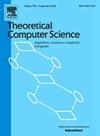The automaticity of the set of primes
IF 1
4区 计算机科学
Q3 COMPUTER SCIENCE, THEORY & METHODS
引用次数: 0
Abstract
For an integer , let . The q-automaticity of a set is the size of the smallest automaton over the alphabet that recognizes on all words of length ≤x. We show that the q-automaticity of the set of primes is at least , which is fairly close to the maximal q-automaticity.
质数集合的自动性
对于整数q≥2,令A={0,1,…,q−1}。集合x的q-自动机A(x)是在字母表A上识别x的所有长度≤x的单词的最小自动机的大小。我们证明了这个素数集合的q-自动性至少为xexp (- c(log log))2log (log) log (log)),这与q-自动性的最大值相当接近。
本文章由计算机程序翻译,如有差异,请以英文原文为准。
求助全文
约1分钟内获得全文
求助全文
来源期刊

Theoretical Computer Science
工程技术-计算机:理论方法
CiteScore
2.60
自引率
18.20%
发文量
471
审稿时长
12.6 months
期刊介绍:
Theoretical Computer Science is mathematical and abstract in spirit, but it derives its motivation from practical and everyday computation. Its aim is to understand the nature of computation and, as a consequence of this understanding, provide more efficient methodologies. All papers introducing or studying mathematical, logic and formal concepts and methods are welcome, provided that their motivation is clearly drawn from the field of computing.
 求助内容:
求助内容: 应助结果提醒方式:
应助结果提醒方式:


